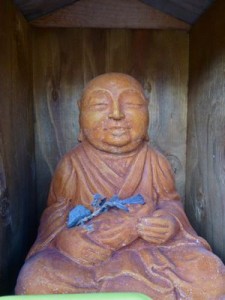Managing Your Energy Part 67: Decompression in Nature

At a spiritual camp in Maui, I spent most of the week compressed into spaces full of people, owing to hard rain, I needed time being mobile and alone. Riding a bike down Haleakala Crater sounded fun, but since the energies of the day presaged some potential danger, I decided to hike up there instead. I headed up as soon as the weather cleared.
I had the uphill road to myself. Scores of cars and their drivers were returning from sunrise vigils. It was great to drive at my own pace, park easily, and walk into the Crater with few people to shatter its deafening silence.
The alien landscape in the Crater is not just silent, it is also desiccating, and thumbing with energy. The living, intense silence sounds like a high pitched Tibetan bowl from a long way off.
When I walk alone in nature I find myself spontaneously doing spiritual practice on my breath. I also feel out my intentions and guidance for moving forward along my life’s journey. If I have any emotional “stuff” in the background of awareness, or energy I need to clear, I work on myself. The rhythm of movement helps me process and aids inspiration.
As I traversed my way through miniature gravel and small volcanic rocks I was enchanted by the way light played on the varied colored earth of bare slopes and mounds. The bowl edge of the Crater helped me gather in big, loving, life energy, which I then sent deep into the ground. An enormous, vital rush of energy pulsed back to me,  pleasurable and magnificent. My fields felt huge. Being up at 9000 feet with nothing around but earth and air felt like being an antenna. It brought me back to essentials.
pleasurable and magnificent. My fields felt huge. Being up at 9000 feet with nothing around but earth and air felt like being an antenna. It brought me back to essentials.
My mind wandered for just a moment. I slipped, spraining an ankle. I sat in the screaming silence, holding my ankle in my hands and having a little talk with it. I have my own way of talking with my hands, moving a few tendons into place, checking the range of motion, and so forth. I told it that it was going to need to stay mobile until I could get out of the Crater. It hurt some, but I didn’t give it a chance to stiffen or inflame.
Walking uphill at altitude was a real workout, even though I’d taken supplements that increase oxygenation in lungs and muscles to help with altitude. I paced my breath with my steps, and with my heartbeat when I took short rests, still standing. I began to work with emotions that came up around hurting my ankle.
I was grateful that I could walk. The crater was still nearly deserted, which I loved. It had become so hot and dry that I that I could imagine expiring quickly in the naked and unrelenting sun. This was silly; the post-sunrise hikers would be along shortly—and they were. I also had water, sunscreen, and appropriate clothing.
Two men came around the corner and stopped, facing me. One beamed at me. He had lovely teeth and eyes and an open heart. He asked, “How ARE you doing?” Given his emphasis and their rapt attention, I told them about my ankle.
The other man said, “I usually bring some poles and just give them to people, but I didn’t today. I’m sorry.” I smiled at these beneficent angels and told them I was doing fine.
Driving down, down, down the hairpin curves on the mountain’s edge, above the clouds, I wanted to get back to the place I was staying, ice my ankle, and connect with a woman who had been staying there before she left. I pushed the speed limit a bit. Two park rangers appeared behind me in Land Rovers. I pulled over and let them pass, along with a small truck, then popped in behind. We rolled down the mountain like a convoy, moving faster than I would on my own. They knew every turn and drove the perfect speed.
I returned feeling expanded and relaxed, despite the sprain.
Do you allow yourself time alone in nature? What is that like for you?
Can you hear the silence in high mountains or deep caves?




















